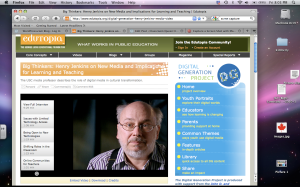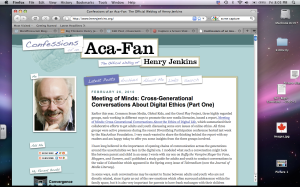Curriculum, pedagogies and practice with ICT in the information age
Nicola Yelland, Chapter 14: page 225
Critical Issues in Early Childhood Education
Edited by Nicola Yelland
This is an reflection that I wrote for a previous class that has relevance to the discussions that I’ve been having with colleagues and supervisors in my school division.
I connected with the challenges that educators are having integrating technology into their classrooms. Yelland comments on the concerns being raised about the amount of time young children spend on computers and whether that time is time well spent. The concerns are not support by research or data. In fact, research is showing that home use of computers support learning. In Jackie Marsh’s article Digikids: Young children, popular culture and media she finds that research supports computer use. On page 189 Marsh quotes “The relationship between literacy learning and computer-game playing is complex, but nevertheless significant” (Gee, 2003; and Pahl, 2005). Many people who object to computer use are focused on violent games, inappropriate web sites and questionable content but are not using research to support their beliefs. I believe as educators we need to teach students responsible use of computers, software and the internet because we see the value of computers for students. I recently read a blog post about filtering of internet in school and how we as teachers need to teach our students what sites they are to use in school and what sites aren’t appropriate. Will Richardson, who wrote the blog post, thought that filtering was a form of classroom management so that teachers didn’t have to teach responsible use.
Yelland’s article also looked at the value of ‘authentic activities’ that students can experience using computers and the internet. In my own case, my students have gone on virtual field trips around North America, dissected a frog, examined and commented on art in museums, visited Auschwitz and collaborated with students around the world. My students also have personal blogs which allow them to post their writing on-line and have an authentic audience to provide feedback. I find it hard to understand that people could not see the value in the experiences students have using technology. Students become excited when they have visitors to their blogs that read their writing or leaving comments. The visitors or their audience provide motivation to continue writing and posting to their blogs but perhaps the biggest factor is that students begin to want to write ‘for’ their audience. Students become better descriptive writers who become more aware of the mechanics of their writing so that they can provide their audience with interesting blog articles to read. The goal is that the blogs can provide authentic audiences, rich discussions, feedback and interactions for the reader and the writer.
On page 226 Yelland states “Children are exposed to computers and a vast range of new technologies in every aspect of their lives. It is impossible for any of us to avoid technologies since they are integratal to everything we do.” Leonie Rowan and Eileen Honan in the article Literaily lost: the quest for quality literary agendas in early childhood education explores the various types of literacies that young children engage in. Young children are already participating in “media literacy, computer literacy, technological literacy, visual literacy or emotional literacy” (page 195). If young children are already exposed to these various literacies why wouldn’t we as educators embrace these opportunities to build upon them as we teach the children? Yelland continues this thought “If schools ignore this (the prevalent use of technology in our society) they cease to be relevant to life in the twenty-first century “(page 226).
On page 227 Yelland questions the new curriculum “there has been an increasing recognition that curriculum decision-making needs to take note of children’s out-of-school experiences and build upon them.” I agree that these questions need to be asked and educators need to be the ones to make changes in their classroom. I also think there should be changes made in teacher education programs that weave technology use throughout the content classes to show pre-service teachers how use technology in the classroom. Yelland quotes Dede who has “called on educators to ‘reshape children’s learning experience in and out of school to prepare them for a future quite different from the immedate past. Meeting this challenge involves teaching new skills, not simply teaching old skills better” (2002, p.178).
These are questions that the articles raised:
1. We can’t avoid technology in our lives so why do we want children to avoid technology in schools?
2. Why is using technology relevant in the twenty-first century?
3. Why doesn’t provincial curricula recognize the value of technology? Does the curricula give teachers any incentive to integrate technology into subject areas?
4. How do you use technology in your teaching/school?
5. What type of technology use do you feel has the most value to students?
6. We can’t avoid technology in our lives so why do we want children to avoid technology in school?
7. Why is using technology relevant in the twenty-first century?
8. What future are we preparing our students/children for?
9. Why doesn’t provincial curricula recognize the value of technology?
10. Does the curricula give teachers any incentive to integrate technology into subject areas?
11. Why do educators have to prove that use of technology is beneficial to students?


 Kelly Christopherson, who I follow on Twitter, posted a blogging challenge. I thought this was a good way to start writing again. My blogging has been sporadic the last few years for an assortment of reasons. I’m not in a classroom situation any more which means that I’m not working with students to use technology. Last year I worked with a grade six class to begin blogging but the class only worked on their blogs once a week when I was with them. My hope was that the classroom teacher would embrace the blog as a way for her class to complete assignments and connect with peers. This school year meant another change and I’m slowly starting to feel comfortable in my new school. If I’m there next year I would love to work with teachers and students in using technology in their classrooms.
Kelly Christopherson, who I follow on Twitter, posted a blogging challenge. I thought this was a good way to start writing again. My blogging has been sporadic the last few years for an assortment of reasons. I’m not in a classroom situation any more which means that I’m not working with students to use technology. Last year I worked with a grade six class to begin blogging but the class only worked on their blogs once a week when I was with them. My hope was that the classroom teacher would embrace the blog as a way for her class to complete assignments and connect with peers. This school year meant another change and I’m slowly starting to feel comfortable in my new school. If I’m there next year I would love to work with teachers and students in using technology in their classrooms. Once in a while I have used the sticky note feature on my desktop but I prefer little yellow sticky notes that I can write reminders on. I sometimes carry the sticky notes with me when I’m completing a task so I don’t forget what I wanted to do.
Once in a while I have used the sticky note feature on my desktop but I prefer little yellow sticky notes that I can write reminders on. I sometimes carry the sticky notes with me when I’m completing a task so I don’t forget what I wanted to do.


